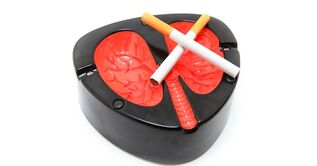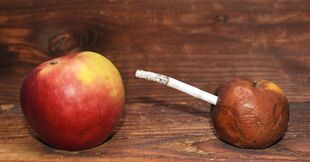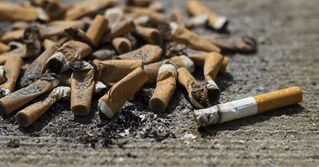Everyone knows about the harmful effects of cigarettes, but not all about the mechanisms of recovery and return to a life without a bad habit. Understanding all the processes that take place in the body can serve as an additional motivation in the fight against nicotine addiction. Let’s look at how it happens and what it means to quit smoking and what we need to do to make it as comfortable as possible to break up with the addiction.
What happens to the body when you quit smoking?
If you stop smoking before the onset of irreversible pathological processes, you can, albeit for a long time, restore your own health. Complete recovery of the body takes 5 to 10 years even after a short but regular use of tobacco products. However, the first signs of performance improvement are seen in a few days.

To do this, you may want to try to record on paper all the feelings that occur when you quit smoking. If you keep a daily diary about quitting smoking, you can be sure of the change that happens every day. It’s also a way to create good motivation for yourself, celebrating every local success in this difficult endeavor.
We will then go into more detail on how to restore all organs and systems.
How does the condition of the internal organs change?
Quitting smoking completely has a beneficial effect on the human body, but not all changes are visible to the naked eye. Let's see some of them:
- Blood pressure drops, the risk of heart attack decreases several times.
- The walls of the blood vessels are strengthened and the organs are enriched with oxygen.
- The bronchi heal, the lungs clear of viscous sputum - breathe easier, shortness of breath and an annoying cough.
- The chances of developing cancer, including the most common of these types, lung cancer, are reduced.
- Smells and taste buds are restored.
- The liver is cleansed after prolonged exposure to toxic substances.
- The risk of sudden death is reduced tenfold.
This is only the main part of what happens after quitting smoking, because almost all of a smoker's organs recover from the effects of toxins and carcinogens in tobacco smoke.
External changes in the body after smoking cessation
Women are most interested in what happens when you quit smoking. We were quick to answer that living without a cigarette only brings positive changes in its appearance. Visual improvements are seen within 4-6 weeks. First, the complexion becomes healthier, the grayish hue disappears as toxins no longer enter the body and the blood is saturated with oxygen. Teeth will be noticeably whiter without being affected by tar in tobacco products. The yellowish tinge that accompanies all smokers disappears from the fingers.
Teeth will be noticeably whiter without being affected by tar in tobacco products. The yellowish tinge that accompanies all smokers disappears from the fingers.
After 6 months, women notice a strengthening of the hair follicles and, as a result, a reduction in hair loss and an improvement in their appearance. Without exposure to tar and toxins, the skin of the body improves thanks to natural collagen production, which is no longer hindered by smoking.
Quitting smoking: what happens in a man's and a woman's body
Human reproductive function is no less than smoking of the cardiovascular system or lungs. But eliminating the intake of toxic substances in cigarettes in a timely manner preserves the health of women and men. So, in addition to general improvements, women may notice the following changes in the body after quitting smoking:
- Normalize hormonal levels because the toxins in tobacco smoke that adversely affect the hormones in the female body will no longer be supplied.
- Improve facial skin condition and reduce the risk of premature aging by normalizing collagen production.
- You are more likely to become pregnant and have a healthy baby.
For men, parting with a bad habit improves their sexual function. This applies not only to increasing potency, increasing the duration of sexual intercourse, but also to the ability of healthy offspring to reproduce.
Most common negative consequences of smoking cessation
Most people who have tried to overcome their own nicotine addiction first notice not positive but rather negative changes. This is not surprising, because in humans, the withdrawal of nicotine intake results in a withdrawal syndrome - a kind of withdrawal. To find out what to prepare for, consider what happens after you quit smoking:
- From the nervous system: increased irritability, decreased concentration, depression, anxiety, poor sleep quality or insomnia, general weakness and rapid tiredness.
- From the digestive system: nausea, sharp increase in appetite, stomach pain.
- Respiratory system: increased cough with discharge of dark sputum.
- From the side of the ear-nose-throat organs: sweating or feeling of a "knot" in the throat, nasal congestion, minor runny nose.
All of these symptoms can be minimized by supporting the body.
How to maintain immunity in the body?
The immune system responds immediately to changes that result in the cessation of nicotine intake, and in the initial stage, this reaction is contrary to expectations. Arguments are made so often that I haven’t smoked in a month and I’ve gotten sick much more often than I’ve been smoking. Former smokers become more susceptible to various viruses and any of them are easily picked up, this involves restructuring the body. Therefore, measures should be taken to strengthen the immune system. So when giving up tobacco products, doctors recommend taking multivitamin complexes in which all the necessary vitamins and trace elements are balanced.

In addition, prescriptions for traditional medicine will not be superfluous in this case. Echinacea tincture, ginseng, green tea with honey and lemon will be a useful helper.
Please note that it is not recommended to use medication if you are divorcing due to a bad habit.
How to help the lungs?
The lungs and bronchi are particularly affected by tobacco smoke, so help them clear the thick secretions as soon as possible. To do this, you need to consume plenty of fluids. Smooth water is ideal. Also pay attention to the humidity of the house. Dry air is known to inhibit productive coughing, thereby slowing the cleansing process.
Herbs and syrups based on them are a good alternative to synthetic mucolytics. A budget and effective option is licorice syrup. You can also use herbal blends of lungweed, horseradish, plantain, elecampane and elderberry in the form of tea. Thus, changes in the body, namely in the respiratory system, during smoking cessation are associated with minimal discomfort.
How to overcome the nervous system disorders associated with breaking a bad habit in the first month?
The greatest number of negative reactions experienced by a former smoker falls on the nervous system. So almost every person records a state of depression and in some cases even depression. If we think about what happens if we quit smoking every day, the nervous system suffers more than others in the initial stages.
As noted above, consuming medications when quitting a cigarette is highly undesirable, but this rule does not apply to sedatives that are effective in treating increased mental stress. However, this medicine should only be used as directed by your doctor.

Herbal enthusiasts should make soothing herbs such as motherwort, peppermint, valerian tea, or in tablet form.
What can you do to prevent you from gaining weight by quitting smoking?
Particular attention should be paid to diet so that changes after smoking cessation do not affect body weight. Weight gain is a consequence of increased appetite, and if you don’t take this issue seriously, you can gain weight severely. Often, this fact frightens women who smoke and forces them to give up the idea of quitting a bad habit.
A diet rich in vegetables and fruits should be included in the diet during the withdrawal period. Fiber is excellent at suppressing hunger and allows it to satiate for a long time. In addition, you should rule out the use of spicy and fatty foods and be careful with desserts and cakes. The same can be said for lollipops and seeds, which for many become a substitute for cigarettes. They should prefer apples, carrots or a glass of clean water.
What happens if you quit smoking every day?
A person may feel the first results of the fight against addiction in the first few days. Moreover, the most pronounced during this period are precisely the negative reactions that, like the positive ones, need to be recorded in the smoker’s diary (if any) in order to get an overall picture, strengthen the spirit, and understand what has already happened and not broken. So what are the risks of quitting smoking:
- 1 day: appetite disturbed, apathy occurs.
- Day 2: Nervousness occurs, insomnia may occur.
- Day 3: The urge to smoke becomes especially strong.
- Day 4: The cough intensifies with the release of sputum.
- Day 5: Constant hunger.
- Day 6: Depression may develop.
- Day 7: Withdrawal syndrome gradually recedes.
At the same time, heart rate and blood pressure stabilize, the risk of heart attack is reduced, the sense of smell is improved and the organs are saturated with oxygen.
Body changes after smoking cessation that occur in one month, one year
For a person who quits smoking, every day of exercising on the body is just the beginning of a long-lasting recovery. However, the first year is the most productive because it is during this period that the maximum number of changes occur, which is reflected not only in its appearance but also in the general condition of the former smoker:
- Lung volume increases, with increased fatigue and shortness of breath during exercise.
- Both physical and psychological dependence on cigarettes will disappear.
- The risk of developing cardiovascular disease is significantly reduced.
- Skin looks more attractive, prevents premature aging.
- Hair becomes brighter, nails become stronger.
- Affected liver cells recover.
- Cough and hoarseness disappear.
At this stage, we can safely say that the addiction is over.
How best to throw hard or gradually?
This question is most common among smokers with different experiences. There is an opinion that based on the duration of the addiction, it is worth fighting the addiction. However, most doctors are of the opinion that quitting smoking will not bring positive results. So the smoker’s habit doesn’t go away and the body continues to demand nicotine. Therefore, the best solution would be a complete and firm rejection of tobacco products. Even though the smoker faces the difficulties described above along the way, he will ultimately preserve the most valuable thing - health.

But there are times when it doesn’t come out suddenly to break away from the addiction. This applies to smokers who consume an average of 1. 5-2 packs per day. In this, it is worth systematically reducing the amount of smoke until it stops completely within a month.
As you can see, there are many obstacles on the road to a healthy, nicotine-free life. The key is to understand that they are all temporary and to adjust to the fact that these temporary difficulties will not allow you to retire before your main goal - to become independent of nicotine.

























